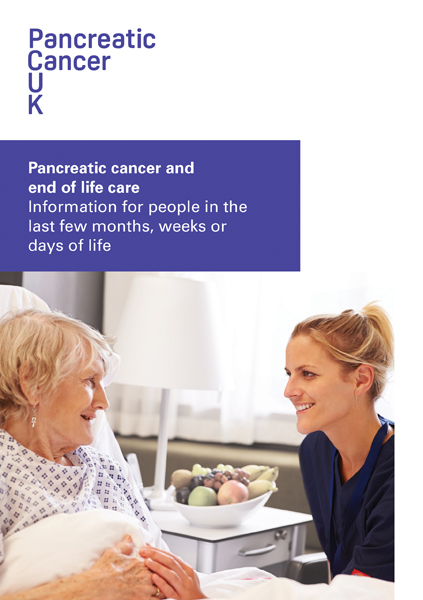Diet, digestion and diabetes at the end of life
Pancreatic cancer can cause problems with digesting food. Read about how to manage these symptoms in the last months and weeks of life.
Read about other symptoms at the end of life
- Pain towards the end of life
- Fatigue at the end of life
- Diet and digestion at the end of life
- Weight loss and reduced appetite towards the end of life
- Feeling and being sick at the end of life
- Stomach emptying slowly towards end of life
- Bowel problems towards the end of life
- Swelling (ascites and oedema)
- Jaundice in the last few months
- Bedsores towards the end of life
- Anxiety and depression towards the end of life
Pancreatic cancer can cause problems with digesting food. This can cause symptoms such as discomfort after eating, wind, bloating, appetite loss, weight loss, and bowel problems such as diarrhoea. Some people get a dry mouth towards the end of life, which can be uncomfortable and make eating more difficult.
If you have diabetes and are approaching the end of life, you will need to speak to your healthcare team about how to manage your diabetes.
How are problems with digestion managed?
Most people with these symptoms will have been given pancreatic enzymes (pancreatic enzyme replacement therapy), which help to break down your food. They can help manage symptoms, and make a big difference to how you feel.
Pancreatic enzymes are taken as capsules with food. You should take pancreatic enzymes with food for as long as you are still eating. If you haven’t been given pancreatic enzymes but you are still eating and have these symptoms, speak to your doctor, nurse or dietitian to see if the enzymes would help. If you are no longer able to eat you don’t need to take pancreatic enzymes.
If you go into a hospice or hospital and are taking pancreatic enzymes, tell the staff about these. Explain that you need to take them with anything you eat to help digest your food, including with meals, snacks and milky drinks. It may help to keep the capsules by your bed.
Hospices or hospitals sometimes look at all your medicines and stop any that are no longer needed to reduce the number of pills you need to take. But it’s important that you continue to take pancreatic enzymes if you are eating.
Diabetes towards the end of life
If you have diabetes as you approach the end of life, the way your diabetes is managed or monitored may change. For example, you may not need to monitor your blood sugar levels as much, and higher blood sugar levels may not be a problem if you are feeling well.
Your blood sugar levels may be affected if you are being sick or have diarrhoea. Some treatments can also affect diabetes, such as nutritional supplements or steroids.
Speak to your doctor, diabetes nurse or pancreatic dietitian for advice about how to manage diabetes. They may talk to you about changing the dose or type of diabetes medicine you take if, for example, you are eating less or have problems swallowing. They can also give you advice about how to manage diabetes alongside your other medicines – such as pancreatic enzymes.
Read more about managing diabetes if you have pancreatic cancer.
Managing diabetes if you have pancreatic cancerDry mouth
Some people get a dry mouth, which can be uncomfortable. It can also make it harder chew or swallow food. You may need more time to talk, or to take sips of fluid more often when you are talking. A dry mouth can be caused by the cancer itself, treatments such as opioid painkillers, or being generally run down.
Read our tips on coping with a dry mouth
Tips for coping with a dry mouthSpeak to our nurses
You can speak to our specialist nurses on our Support Line with any questions about digestion, taking pancreatic enzymes or managing diabetes at the end of life.

Read our booklet about end of life care
To read more about diet, digestion and diabetes at the end of life, download our booklet, Pancreatic cancer and end of life care: information for people in the last months, weeks and days of life.
You can also order a physical copy.

Published April 2021
Review date April 2024